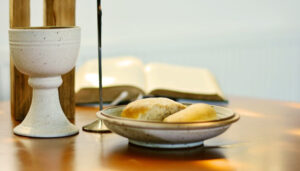Readings: Exodus 24:3-8; Psalm 116; Hebrews 9:11-15; Mark 14:12-16,22-26
 Bread is the staple of many cultures: white, rye, sourdough, Middle Eastern pita, tortillas and pan dulce from LatinX countries, French baguettes, Ethiopian injera flatbread, Irish soda bread, Italian pane di casa, Indian naan, brown and rye breads from Eastern Europe, pretzels from Germany, Japanese shokupan, banh mi from Vietnam. On this feast of Corpus Christi we celebrate the bread that Jesus gives us: his very self, his very life, so that we might have life to the full.
Bread is the staple of many cultures: white, rye, sourdough, Middle Eastern pita, tortillas and pan dulce from LatinX countries, French baguettes, Ethiopian injera flatbread, Irish soda bread, Italian pane di casa, Indian naan, brown and rye breads from Eastern Europe, pretzels from Germany, Japanese shokupan, banh mi from Vietnam. On this feast of Corpus Christi we celebrate the bread that Jesus gives us: his very self, his very life, so that we might have life to the full.
For long months, the COVID-19 pandemic has kept many from receiving the Eucharist in person. I’m sure I’m not the only one for whom that experience – that lack – caused me to think more deeply about just what the Body of Christ means to me – the sacred bread that is meant to be taken, blessed, broken and shared, Christ’s Body that he gives to us freely, the Body that we are called to be, for one another and for our world. Whether making my way up a church aisle – six feet apart – with other hungry, ordinary folks like me, or watching Mass livestreamed from places near and far and being invited to a “spiritual communion,” or seeing the broken Body of Christ bruised and broken when people of color, immigrants or unwitting bystanders are viciously attacked, I have been given a new appreciation of receiving the Body of Christ as well as a broader experience of meeting and being the Body of Christ.
Perhaps this feast, this year, invites each of us to ask ourselves:
Has my experience of meeting Christ in the Eucharist changed? How?
In what new and renewed ways do I meet the Body of Christ?
What does it mean for me to take, bless, break and share the bread of my life?
– Sr. Regina Bechtle
~ ~ ~ ~
The words that SC Associate Bill Hurley wrote for last year’s Corpus Christi 2020 reflection, three months into the COVID-19 pandemic, still ring true:
“…[W]e are being shown many ways to celebrate the presence of Jesus in ourselves and others. These past…months have allowed us to reflect on our lives, to walk quietly with Christ, to review our life goals and to renew old friendships. Today’s hardships have let us reflect on the gift of life and good health. We have been made more aware of the homeless and victims of domestic violence. We have been shown the courage of neighbors: nurses, doctors, hospital staff, EMS workers, food providers, postal workers. We are more aware of the importance of farm workers, many of whom are undocumented. I have also witnessed the courage of local food pantry workers, three of whom developed COVID-19, another who died. All of these women and men have come to be the ‘Face of Christ.’ During [this time], we have also come to witness Christ in the faces of those suffering a lifetime of pain because of racism.” (excerpt, adapted)
~ ~ ~ ~
Celeste Mueller, D.Min., continues this theme in her reflection on Corpus Christi on the website catholicwomenpreach.org/ :
“Today’s solemnity of the Body and Blood of Jesus, can, if we will allow it, expose the divisions in our hearts and the ways we so easily feed violence as we participate in fracturing relationships and dividing communities. Today’s celebration invites us to metabolize the violence in our hearts and in our world, as we take into ourselves the lifeblood that heals all that divides us, the body and blood that makes us one…
‘The bodies broken daily by violence are our bodies; it is our blood spilled out. The enraged, or perhaps cold, blood that flows through the veins of the perpetrators of violence, is pumped by our hearts as well.
“And together we receive, our common healing and transformation through our participation in the free gift of Jesus: This is my body, This is my blood, which is for you.”
~ ~ ~ ~
The Sunday Website at St. Louis University offers rich resources for each Sunday’s Scriptures: liturgy.sluhostedsites.org/ For this Sunday’s feast Ron Rolheiser, OMI, a noted preacher and writer, presents the Eucharist as a physical connection with Jesus:
“For most of [Jesus’] ministry, he used words… But at a time, powerful though they were, they too became inadequate…So on the night before his death, having exhausted what he could do with words, Jesus went beyond them. He gave us the Eucharist, his physical embrace, his kiss, a ritual within which he holds us to his heart. To my mind, that is the best understanding there is of Eucharist.” (excerpt)
~ ~ ~ ~
Today with these few thoughts for Corpus Christi, we move into Ordinary Time and take a break from our weekly reflections. In their place, we encourage you to visit the website links above and the additional ones below. All can offer much food for your summertime thought and prayer. Have a safe and peaceful summer!
o A reflection on the Sunday readings is usually posted mid-week on the website of the worldwide Vincentian Family – https://famvin.org/en/ – of which the Sisters of Charity are part.
o Creighton University’s Online Spirituality Resources website is a treasure trove on many topics in prayer and spirituality: onlineministries.creighton.edu/CollaborativeMinistry/online-spty.html
